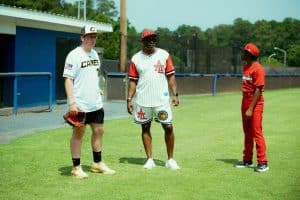 Noted author Alfie Kohn once said, “Assessments should compare the performance of students to a set of expectations, never to the performance of other students.”
Noted author Alfie Kohn once said, “Assessments should compare the performance of students to a set of expectations, never to the performance of other students.”
I just love this quote. It is so timely since so many hitters are having tryouts now to make teams for the 2024 summer Travel Baseball season.
Excellence is one of the core values I live by. For me, excellence simply means to meet expectations. Since meeting expectations is so important to me, I have to ask questions of people who are expecting things from me so that I don’t get caught up doing things I am not supposed to do with people I am not supposed to do with.
Before hitters can train with me, they must start with a thorough two-hour assessment, which begins with me asking the questions that must be asked—or should ask questions (SAQs).
The questions include:
- What is your purpose for being here today?
- What is your short-term (one to five years) baseball goal?
- What is your short-term (one to five years) life goal?
- How does your family define success?
- What’s one thing your family needs to stop doing to help you be successful, according to your family definition of success?
- How will you handle an assessment from me that you do not agree with?
After I get their answers, we move to a visual assessment followed by a physical swing assessment.
When the auditory, visual and physical assessment is complete, I determine my mental and emotional capacity to coach them.
My time is more important than money and being excellent is a vital part of my legacy.
During my 26 years of being a professional baseball hitting coach, I have had several hitters—some as young as 5—expect me to help them become collegiate hitters. And we have accomplished it. I have had hitters as young as 10 expect me to help them become Major Leaguers—and we have done that, too.
Carol Ann Tomlinson once said that “assessment is today’s means of modifying tomorrow’s instruction. Assessments should compare the performance of students to a set of expectations, never to the performance of other students.”
Social media is full of how-to baseball drills. I view and love lots of them. Often, I see viral hitting drills I started doing in the early 2000s.
For me, recognizing the root cause of the problem is important. It is the reason we do a drill. When to do it supersedes how to do it.
It is like taking medicine. You shouldn’t use eye drops to help you with a headache just because your eyes are in your head.
This is important because so many hitters and their parents fall in love with drills because it worked for someone else. What works for Ronald Acuña and Peter Alonso may not work for you because of different learning styles, aptitude, mental, emotional and physical strength.
Before starting hitting drills, answer these questions for yourself:
- Why am I playing baseball?
- What problem am I having as a hitter?
- Is it mental, physical or both?
- What drill do I need to do to fix my swing?
- Why am I doing this drill?
- When do I need to start doing the drill?
- When do I need to stop doing it?
- How do I do it?
Make a commitment to yourself this fall to try new things to see what works and what doesn’t. You owe it to yourself. And don’t get caught up in comparing yourself to others because there is no comparison between the sun and the moon. They shine when it is their time.
For more information, visit L.E.A.D. Center for Youth today. Also, check out our Digital Magazine.
C.J. Stewart has built a reputation as one of the leading professional hitting instructors in the country. He is a former professional baseball player in the Chicago Cubs organization and has also served as an associate scout for the Cincinnati Reds. As founder and CEO of Diamond Directors Player Development, C.J. has more than 22 years of player development experience and has built an impressive list of clients, including some of the top young prospects in baseball today. If your desire is to change your game for the better, C.J. Stewart has a proven system of development and a track record of success that can work for you.


